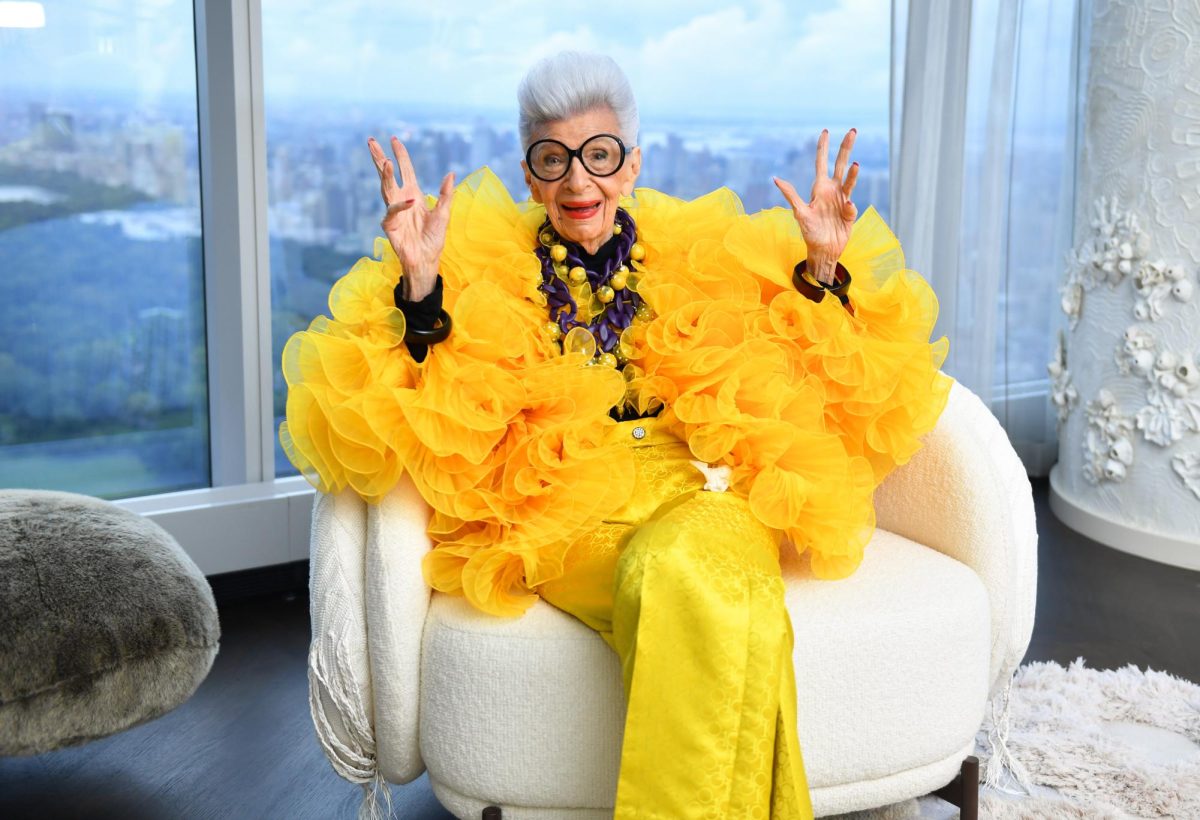Iris Apfel, a businesswoman, model, clothing designer and interior decorator, passed away on March 1 at 102 years old. Known for her vibrant wardrobe, eclectic jewelry and oversized sunglasses, Apfel’s personal style was emblematic of her individuality and artistic nature. Her authenticity and non-conformity have shattered the boundaries of how elderly people, particularly women, can present themselves aesthetically. She was a talented force within the fashion industry, and inspired others to indulge in the joy of creativity and self-expression.
Born in 1921, Apfel (née Barrel) was a New York native with an appreciation for Manhattan. She would take the subway on a weekly basis to shop at antique stores to grow her extensive jewelry collection. During the Great Depression, Apfel learned how to sew, drape and glue fabric, deepening her passion for fashion and design. She studied art history at New York University and later attended art school at the University of Wisconsin. Upon graduating, she worked as a copywriter for Women’s Wear Daily, a prominent fashion magazine of the early 20th century. She soon entered the world of interior design, collaborating with designers like Elinor Johnson and Robert Goodman.
In 1948, she married her husband, Carl Apfel, and they founded their own textile company called Old World Weavers. They collaborated closely with museums as well as the White House. Apfel worked with nine U.S. presidents, including Harry Truman, Dwight Eisenhower, John F. Kennedy, Lyndon Johnson, Richard Nixon, Gerald Ford, Jimmy Carter, Ronald Reagan and Bill Clinton. The value of Apfel’s work partially came from her dedication to sourcing the highest quality of fabric and her appreciation for different cultures’ textiles. When working with clients, Apfel collected antique furniture, clothing and jewelry pieces from many different countries.
Despite her artistic talent and work with high profile clients, Apfel was not widely known until 2005, when, at the age of 84, the Metropolitan Museum of Art’s Costume Institute decided to exhibit her costume jewelry collection. This brought her public attention and the museum described Apfel as “one of the most vivacious personalities in the worlds of fashion textiles and interior design.” Six years later, in 2011, Apfel was appointed as a visiting professor at the University of Austin, and in 2015, legendary filmmaker Albert Maysles made a documentary about her work, furthering her publicity.
At the age of 97 in 2019, Apfel signed with IMG Models, and her presence in the modeling industry provided a sense of liberation and self-acceptance to other elderly people. She was featured in a Vogue Italia spread, a Kate Spade campaign, M.A.C. ads and was also a cover star in Dazed & Confused Magazine. The president of IMG Models, Ivan Bart, stated that Apfel “continued to prove that age is just a number and shouldn’t be something that defines you.”
Apfel was committed to her work, even during the last years of her life. Defying gender norms, she advocated for women to be in the workplace and to have agency over childbirth and raising families. Her talent and impressive work ethic redefined the role of elderly people in society, and she continuously built her craft as a designer, regardless of her age. She left behind a remarkable legacy, rejecting ageist beauty standards and establishing herself as a powerful, artistic and maximalist presence.
Laleh Panahi can be reached at [email protected]




















